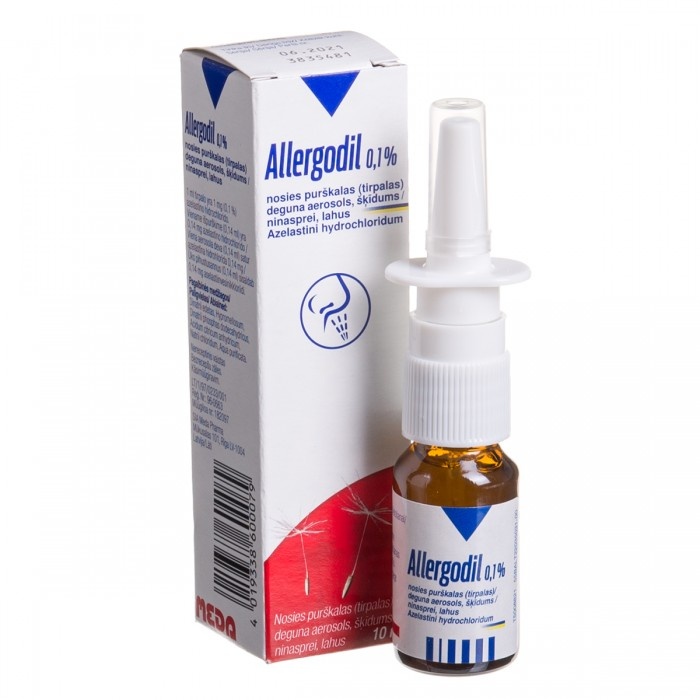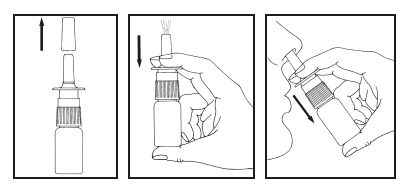

Allergodil

Ask a doctor about a prescription for Allergodil

How to use Allergodil
Leaflet attached to the packaging: patient information
ALLERGODIL, 1 mg/ml (0.1%), nasal spray, solution
Azelastine hydrochloride
Read the leaflet carefully before using the medicine, as it contains
important information for the patient.
This medicine should always be used exactly as described in this patient leaflet or as advised by your doctor or pharmacist.
- Keep this leaflet, you may need to read it again.
- If you need advice or further information, ask your pharmacist.
- If you experience any side effects, including those not listed in this leaflet, tell your doctor or pharmacist. See section 4.
- If after 3 days there is no improvement or you feel worse, you should contact your doctor.
Table of contents of the leaflet
- 1. What is Allergodil nasal spray and what is it used for
- 2. Important information before using Allergodil nasal spray
- 3. How to use Allergodil nasal spray
- 4. Possible side effects
- 5. How to store Allergodil nasal spray
- 6. Contents of the pack and other information
1. What is Allergodil nasal spray and what is it used for
Allergodil nasal spray, solution belongs to a group of medicines called antihistamines. Antihistamines work by preventing the action of histamine, which is produced by the body as part of an allergic reaction.
Indications for use of Allergodil nasal spray are:
- treatment of symptoms of seasonal allergic rhinitis (hay fever);
- treatment of symptoms of non-seasonal (perennial) allergic rhinitis.
Symptoms of allergic rhinitis occur when a person comes into contact with a specific allergen. In the early phase of the allergic reaction, watery discharge from the nose, sneezing, itching, and nasal congestion occur.
The onset of action of Allergodil nasal spray occurs within 15 minutes after administration. The symptoms of allergic rhinitis should subside during this time and this condition should last for about 12 hours.
Allergic rhinitis can be chronic, when symptoms persist for more than 4 days a week and for more than 4 weeks.
2. Important information before using Allergodil nasal spray
When not to use Allergodil nasal spray
- if you are allergic to azelastine hydrochloride or any of the other ingredients of this medicine (listed in section 6),
- in children under 6 years of age.
Warnings and precautions
Allergodil nasal spray should not be used in case of a cold, flu or other infections.
Children
Allergodil nasal spray should not be used in children under 6 years of age.
Allergodil nasal spray and other medicines
Tell your doctor or pharmacist about all medicines you are taking, or have recently taken, and about medicines you plan to take.
No interactions with other medicines are known.
Using Allergodil nasal spray with alcohol
As a general rule, people taking medicines should avoid drinking alcoholic beverages.
Pregnancy and breastfeeding
If you are pregnant or breastfeeding, think you may be pregnant or plan to have a child, ask your doctor for advice before taking this medicine.
Due to the lack of sufficient data and experience in humans regarding the safety of use during pregnancy and breastfeeding, Allergodil nasal spray should not be used during this period.
Driving and using machines
When using Allergodil nasal spray, in individual cases, the following may occur: fatigue, tiredness, exhaustion, dizziness or weakness. In such cases, the ability to drive and use machines may be impaired, and therefore you should not drive or use machines then. Consuming alcohol further enhances this adverse effect.
Allergodil nasal spray contains disodium edetate,which may cause allergic reactions in sensitive patients.
3. How to use Allergodil nasal spray
This medicine should always be used exactly as described in this patient leaflet or as advised by your doctor or pharmacist. If you are unsure, ask your doctor or pharmacist.
Allergodil is intended for nasal use.
Adults, adolescents and children over 6 years of age:
Unless otherwise advised, spray a single dose of Allergodil nasal spray into each nostril, twice a day (morning and evening, which corresponds to a daily dose of 0.56 mg of azelastine hydrochloride per day).
This medicine can be used until the symptoms subside. The longest observation period in adults who used azelastine hydrochloride in the form of a nasal spray in a clinical trial was 12 months, and in children 6 months. The duration of treatment depends on the type, duration, and course of symptoms, and is determined by the doctor. The medicine should not be used without consulting a doctor for more than 4 weeks. If the symptoms worsen or, despite the use of the medicine, no improvement occurs after 3 days, you should consult a doctor. Allergodil nasal spray can only be used in people with a doctor-diagnosed periodic or chronic allergic rhinitis and according to the principles determined by the doctor.
In case of doubts related to the use of the medicine, ask your doctor or pharmacist.
Allergodil nasal spray should be administered with the head in an upright position (according to the instructions below).

- 3. Spray a single dose into each nostril, with the head in an upright position.
- 1. Remove the protective cap.
- 2. Before the first use, press the dispenser several times until a uniform "mist" appears.
- 4. Put the protective cap back on.
Using a higher dose of Allergodil nasal spray than recommended
No cases of azelastine hydrochloride overdose have been reported in humans. After using too high a dose of the medicine administered into the nose or in case of accidental oral intake, you can expect disorders of the central nervous system (drowsiness, disorientation, coma, tachycardia, hypotension) similar to those found in animal studies. In such cases, you should consult a doctor who will administer symptomatic treatment.
Missing a dose of Allergodil nasal spray
In case of missing a dose of Allergodil nasal spray, there is no need to take any special action. Continue the treatment, taking the next dose of the medicine at the usual time.
Stopping the use of Allergodil nasal spray
If possible, use Allergodil nasal spray regularly until the symptoms subside.
If you stop using Allergodil nasal spray, there is a risk of recurrence of typical disease symptoms.
In case of any further doubts related to the use of this medicine, consult your doctor or pharmacist.
4. Possible side effects
Like all medicines, this medicine can cause side effects, although not everybody gets them.
In case of the first symptoms of an allergic reaction(which may be: swelling of the face, tongue or throat, swallowing problems, hives, wheezing or breathing difficulties) stop taking Allergodil nasal spray immediately
and consult a doctor.The doctor will then assess the severity of the symptoms and decide whether further action is necessary.
The following side effects are listed according to their frequency.
Common(may occur in less than 1 in 10 patients): when the medicine is administered incorrectly (with the head tilted back, see section 3), a bitter taste in the mouth, which can rarely cause nausea.
Uncommon(may occur in less than 1 in 100 patients): irritation of the changed nasal mucosa (e.g., burning, itching), sneezing, and nosebleeds.
Rare(may occur in less than 1 in 1,000 patients): nausea.
Very rare(may occur in less than 1 in 10,000 patients): hypersensitivity, fatigue (tiredness, exhaustion), dizziness, weakness, which can also be caused by the disease, rash, itching, hives.
If you experience any of the above side effects, tell your doctor.
Countermeasures
Usually, the above side effects are temporary. Therefore, there is no need to take any special action.
In case of a bitter taste in the mouth after using Allergodil nasal spray, drink a non-alcoholic beverage (such as juice or milk) to neutralize it.
Reporting side effects
If you experience any side effects, including those not listed in this leaflet, tell your doctor or pharmacist. Side effects can be reported directly to the Department of Monitoring of Adverse Reactions to Medicinal Products of the Office for Registration of Medicinal Products, Medical Devices and Biocidal Products Al. Jerozolimskie 181 C, 02-222 Warsaw, phone: +48 22 49 21 301, fax: +48 22 49 21 309 website: https://smz.ezdrowie.gov.pl Side effects can also be reported to the marketing authorization holder. By reporting side effects, you can help provide more information on the safety of this medicine.
5. How to store Allergodil nasal spray
Keep this medicine out of the sight and reach of children.
Do not use this medicine after the expiry date stated on the label and carton. The expiry date refers to the last day of the month.
Storage conditions
Store Allergodil nasal spray at a temperature between 8 °C (do not store in a refrigerator). Do not freeze.
Do not use this medicine if you notice crystals: If Allergodil nasal spray has been stored by mistake for a longer period at a temperature below 8 °C (e.g., in a refrigerator), the active substance of the medicine will start to crystallize to some extent. If you look through the bottle "into the light", crystals ("needles") will become visible. Do not use such a solution. However, after several hours of storing the solution at room temperature, the crystals will completely disappear. You can then continue using the clear solution (the "needles" are no longer visible).
Shelf life after opening the bottle
Do not use Allergodil nasal spray after opening the bottle for more than 6 months.
Medicines should not be disposed of via wastewater or household waste. Ask your pharmacist how to dispose of medicines that are no longer needed. This will help protect the environment.
6. Contents of the pack and other information
What Allergodil nasal spray contains
- The active substance of the medicine is azelastine hydrochloride. 1 spray (0.14 ml) contains 0.14 mg of azelastine hydrochloride. 1 ml of solution contains 1 mg of azelastine hydrochloride. 10 ml of solution contains 10 mg of azelastine hydrochloride.
- Other ingredients: disodium edetate, hypromellose, sodium phosphate dodecahydrate, citric acid, sodium chloride, water for injections.
What Allergodil nasal spray looks like and what the pack contains
Allergodil nasal spray is a solution.
Allergodil nasal spray is available in a bottle with a nasal applicator containing 10 ml of solution. The bottle is placed in a cardboard box.
Marketing authorization holder
Cooper Consumer Health B.V.
Verrijn Stuartweg 60
1112AX Diemen
Netherlands
Manufacturer
Madaus GmbH
51101 Cologne
Germany
For more information, please contact:
Viatris Healthcare Sp. z o.o.
phone: 22 546 64 00
Date of last revision of the leaflet:
- Country of registration
- Active substance
- Prescription requiredNo
- ImporterMADAUS GmbH
- This information is for reference only and does not constitute medical advice. Always consult a licensed doctor before taking any medication. Oladoctor is not responsible for medical decisions based on this content.
- Alternatives to AllergodilDosage form: Aerosol, 1 mg/mlActive substance: azelastineManufacturer: Galenicum Health, S.L.U. SAG Manufacturing S.L.U.Prescription not requiredDosage form: Aerosol, 1.5 mg/mlActive substance: azelastinePrescription not requiredDosage form: Aerosol, 1.5 mg/mlActive substance: azelastinePrescription not required
Alternatives to Allergodil in other countries
The best alternatives with the same active ingredient and therapeutic effect.
Alternative to Allergodil in Spain
Alternative to Allergodil in Ukraine
Online doctors for Allergodil
Discuss dosage, side effects, interactions, contraindications, and prescription renewal for Allergodil – subject to medical assessment and local rules.








